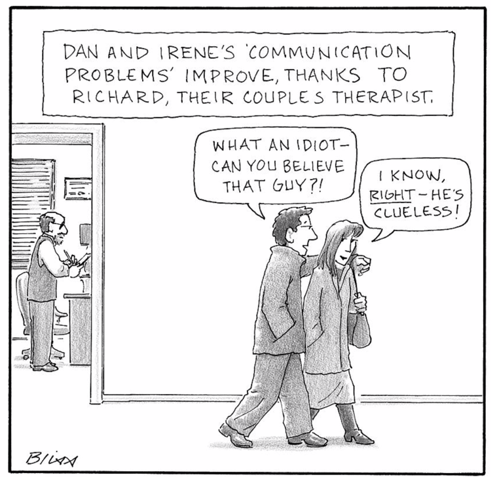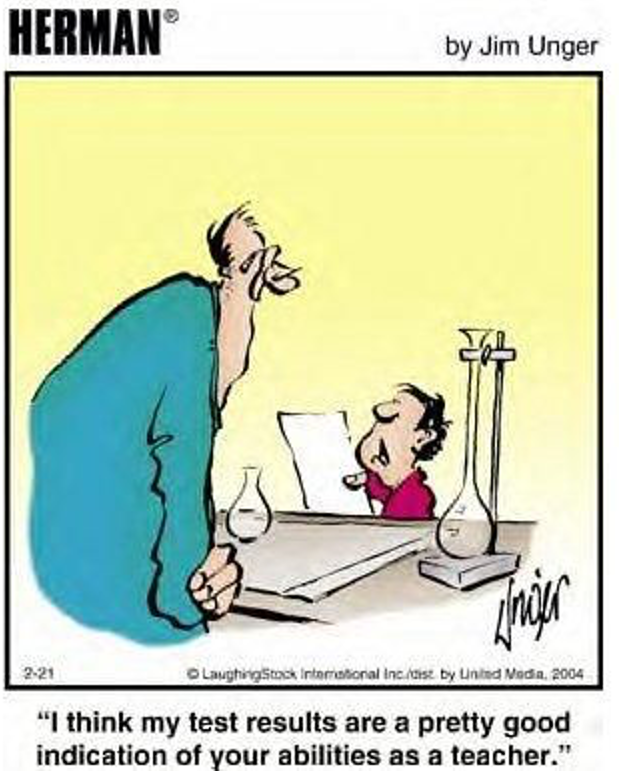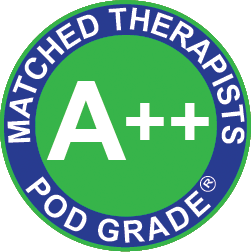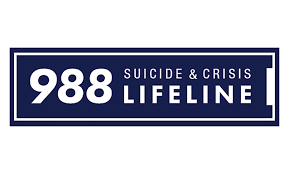ad
by Dr. David R. Kraus, President

We've been studying the unique skills of therapists for decades. Few, if any, are good at everything, so the key is finding an exceptional therapist for you, or more specifically, finding someone who is great at treating the very same issues with which you want help. That's a complicated scientific matching problem that the old systems cannot solve. Why? Because none are scientific.
 At the turn of the last century, more than 120 years ago, medicine was little more than witchcraft - doctors doing what their instincts or past experience with one patient taught them. It wasn't until the scientific method was widely adopted and doctors used science to test, often in controlled trials, what worked and what didn't, that medicine… became medicine. Over the past hundred years, the two primary pillars of healthcare (assessment and treatment) have advanced. Left behind is the bridge between the two - the referral process, which is stuck in the dark ages. No wonder you may feel like you are flipping a coin when selecting a therapist.
At the turn of the last century, more than 120 years ago, medicine was little more than witchcraft - doctors doing what their instincts or past experience with one patient taught them. It wasn't until the scientific method was widely adopted and doctors used science to test, often in controlled trials, what worked and what didn't, that medicine… became medicine. Over the past hundred years, the two primary pillars of healthcare (assessment and treatment) have advanced. Left behind is the bridge between the two - the referral process, which is stuck in the dark ages. No wonder you may feel like you are flipping a coin when selecting a therapist.
Even in the best-case scenario, a perfect referral is a two-part process, with the first part being scientific, and the second being emotional. Out of that first part, you still need a few choices to emerge. Here is why.
Unlike the rest of medicine, how therapy works is different. Therapy helps people feel better and make changes in their lives through a relationship, not with pills or surgery. Sometimes therapists help model new ways of interacting with the world by helping you test the waters in a safe environment, inside the therapist's office. Sometimes therapists are trusted coaches who help advise and teach along the way. In either case, you are trusting someone else with the intimate details of your life. You cannot do this hard work with someone you don't respect, don't get along with, or someone who just rubs you the wrong way. No referral source or scientific process can predict with whom you will have good chemistry. The second step, the emotional, almost dating-like part of finding an exceptional therapist, is something we can help with as well. For now, let's get back to the first two steps, the scientific matching problem.

Let's make it simple. To solve a scientific matching problem, you need to assess the needs and strengths of the two people who will be matched. Take the analogy of a coach or tutor for a high school student having trouble with chemistry. Some tutors may know a lot about math, and, sure, there is a lot of math in chemistry, especially when balancing equations, but you need to know a lot more. Matching the student with an exceptional math tutor who has never taken a chemistry class is unlikely to work.
Second, you'd probably want to know something about why the teen is having trouble. Is it more of a confidence problem, a discipline problem of not practicing enough, or is it a fundamental understanding problem? Some tutors can be powerful motivators; others are better at explaining things in a way that makes complex problems seem simple. Matching the tutor's strengths to the teen's needs is essential when looking for the right professional.
Here are reasons why the old (before the year 2021) methods of finding a therapist don't improve our odds of finding an exceptional therapist. We'll take them on one at a time.
On-line Directories
If you try to search for a therapist on-line, you will likely be directed to an on-line directory of therapists who are looking for clients. These directories are just glorified yellow page listings. No, you say, some have certified logos! Read the fine print. Most everyone has these certified logos and these just mean that someone allegedly has double checked that they are, in fact, licensed in the state in which they are listed. That's not a great endorsement for exceptionalism.
Sure, on these listing sites, you can see a pretty picture, or not. Let's admit it. We are human. Many of us would rather see someone who is attractive, all other things being equal. But even though finding a therapist has a lot of similarities to dating and doing your best to make a good decision before making a long-term commitment, sexual attraction or curb appeal is not a good proxy for therapeutic effectiveness. Let's be frank. Sometimes it is easier to talk about complex and intimate issues of sex, drug addiction and suicide with someone who we don't find attractive in that way. Think of it this way. If you find yourself deeply attracted to your therapist, you've now got more of an incentive not to show them your warts or dirty laundry. But it's your warts and dirty laundry that you are really there to discuss.
Further, on these listing sites, you can read what feels like a lot of psychobabble about how each therapist works, and after you have read ten of these, you can almost predict what the next one might say. However, none of these sites help you discover what your needs really are, nor discover the unique strengths of each therapist.
Some of the better listing services have each therapist check off boxes of what types of services they provide, but no one is evaluating whether they, for example, deliver cognitive behavioral therapy with the fidelity that is achieved in scientific research. No one is evaluating that therapist's results compared to other therapists in their area so that you know that you are being referred to someone who actually does get great outcomes when treating, say, depression.
That's how MatchedTherapists.com is different. We bring science to finding a therapist. Start with Step 1 and assess your stress and symptoms.
Insurance Company Directories
These listings can be hard to find, let alone navigate. It's almost as if the insurance companies don't want you to use them. They are often as bad or worse than a telephone directory. Some insurance companies are "profiling" their therapists and giving them one, two or even three gold stars, as if they are in kindergarten. These profiles are often based on how much business the therapist does with that insurance company, leaving you to wonder that if the therapists can drive you away in a session or two, maybe the insurance company considers that good therapy and lists them as exceptional, because the health plan is saving money.
These listings do have some limited value, though. If you want insurance to pay, or partial pay, for your treatment, you may need a referral from your primary care physician and, at a minimum, ensure that the therapist takes your insurance.
Insurance companies can help solve this scientific matching problem. Call yours today and invite them to integrate science into their find-a-doctor listings.
Work Resources
Many employers have a human resource (HR) department and/or an employee assistance program that can be a source of therapy referrals. Believe it or not, one of the most common questions posed to the HR department is: "Can you help me find a good therapist?"
Some HR departments have made lots of referrals and may even have some feedback from folks who walk back into the office and say, "Thanks! Dr. Z is fantastic." Others, might walk back in and say, "What? Are you joking? Maybe it's you who should be getting some help. Dr. Y is a disaster." HR directors usually only hear the extremes. Those whose experiences are in the middle rarely walk back into the office to give feedback.
This is why therapist reviews or on-line ratings are unhelpful and certainly not scientific. Only the very satisfied or very unsatisfied respond, and in very small numbers at that. That's like taking a Presidential election poll by asking your neighbor, or by keeping track of who calls into a talk show on the subject. Think about the pros and cons of having reviews on a dating site. No, not of the dating site itself, but a place for people that have dated to leave reviews of each other.
Family or Trusted Friends
Many people would rather not tell their friends or family that they are thinking of seeing a therapist. For many, it's a taboo subject, one, unfortunately, filled with shame. Here's a common scenario facing someone who has just lost a loved one in a tragic accident. Life feels meaningless. You wake up with a hole in your stomach and a fog surrounding most everything you do. You cannot stop crying and people that ask you how you are feeling, soon stop asking because they mistake your crying in response as: they made you cry. As if the sadness wasn't already there.
Someone might say to you, or you might say to yourself, "You don't need therapy. You're not crazy or anything. You just lost your daughter in a car crash. Therapy's not going to change that. You just need time."
Now, here's the thought experiment: Think of someone saying the same thing about a broken bone. Let's say you were in that car and no one died, but you and your daughter broke your legs. Think of someone saying: "You don't need to go see a doctor. You know why you broke your bone. You just need time."
Until we as a society see therapy as a great option for people facing unsurmountable stress, we will continue to say to ourselves, "Maybe I just need some more time." This keeps us from asking our friends and family for help in finding a referral for a therapist, or even talking about our stress.
Others of us have no problem asking for help in finding a referral for a therapist. Just remember that because someone else loves their therapist doesn't mean that you will too, but it's a great place to start. Even if that therapist doesn't specialize in what you want or need, they can help make a professional referral.
Professional Referrals
Asking your primary care physician or a friend's therapist for help in finding a referral is a great place to start.
However, in recent years, we have found several problems with the larger primary care practices. First, their lawyers advise them not to get involved for fear of being sued.
Second, most large primary care practices have an internal policy of referring only to their internal team of therapists or to a select group of outside partners. Rather than putting your medical needs first, this puts the financial needs of the institution in competition with yours.
Finally, professionals can only guess at what each therapist in their referral network is good at because they suffer from the same unscientific data problem that the HR director has - they only hear the feedback from the very satisfied or very dissatisfied clients. Further satisfaction has little correlation to actual clinical outcomes, meaning that some people are satisfied with the care they received but are not doing much better with their depression symptoms. Think of this: Would you rather have your depression cured (and some people do find a cure), or would you rather love your therapist and still feel depressed? Sometimes a great therapist knows when to push and when to back off.
Most importantly, we'll let you in on a horrible secret of our industry. We'll call it the Lake Wobegon Effect. Therapists are horrible at predicting their strengths and weaknesses. Professor Lambert's team at Brigham Young has studied it, as have we. The correlation between what a therapist thinks they are good at and what they are good at is close to zero. When asked to rate themselves on a scale of effectiveness compared to their peers, all therapists rate themselves as above average. It's like what Garrison Keilor says in his closing during his Lake Wobegon stories:
"Well, that's the news from Lake Wobegon, where all the women are strong, all the men are good-looking, and all the children are above average."
Obviously, half the therapists are wrong in their self-assessments. When asked to predict with which clients they will succeed or fail, in one study, not one experienced clinician predicted their failures.
This is why the solution to the matching problem has to be objective, independent, and scientific.
The New Way to Finding a Therapist - Scientific Matching

We solve all the problems with the old ways of finding an exceptional therapist. We even give your matches a grade. The science has been tested in a randomized clinical trial and published by the American Medical Association's JAMA Psychiatry journal. Read more about how it works.
Get started for free with Step 1 - assessing your needs (about 10 minutes). We look forward to assisting you on your journey to find a better life, a better sense of self, life satisfaction, better communication with your partner, or any other goals you have.
David R. Kraus, PhD is a licensed psychologist who has spent the past thirty years measuring the quality of behavioral healthcare and finding the unique skills and strengths in most every clinician. He holds several US Patents including an innovative method of using clinician performance data to scientifically match prospective clients with a short list of therapists who have a proven track record of helping similar patients. This method has been proven in the first federal, randomized clinical trial of a referral process in any field of healthcare.

